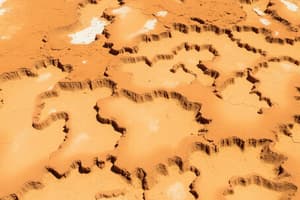Podcast
Questions and Answers
What are lakes formed from?
What are lakes formed from?
- Meteor impacts
- Glacial activity
- Erosion dissolving limestone (correct)
- Volcanic activity
How many lakes are there in Florida?
How many lakes are there in Florida?
7000
What does a river do?
What does a river do?
- Carries and drops sediment (correct)
- Traps heat
- Forms mountains
- Creates rainbows
What is a delta?
What is a delta?
What is the boundary between land and the ocean called?
What is the boundary between land and the ocean called?
What do sand dunes do?
What do sand dunes do?
What is an example of a wetland in Florida?
What is an example of a wetland in Florida?
Which Florida region has beaches and wetlands?
Which Florida region has beaches and wetlands?
What is a bay?
What is a bay?
Where do most sinkholes occur in Florida?
Where do most sinkholes occur in Florida?
What should small sinkholes be filled with?
What should small sinkholes be filled with?
What is a sinkhole?
What is a sinkhole?
What conditions favor sinkhole formation?
What conditions favor sinkhole formation?
What was the cause of the Winter Park Sinkhole?
What was the cause of the Winter Park Sinkhole?
Which oceanic sinkhole is located in Mexico?
Which oceanic sinkhole is located in Mexico?
Flashcards are hidden until you start studying
Study Notes
Landforms in Florida
- Lakes formed through erosion of limestone; Florida has approximately 7,000 lakes, including Lake Okeechobee.
- Rivers transport and deposit sediment, shaping coastal features like beaches and barrier islands.
- Deltas, typically fan-shaped, form at river mouths as they deposit sediment.
- Coastlines serve as the interface between land and ocean.
- Sand dunes protect coastlines from storms; formed by wave-carried sand and wind action, promoting plant growth like sea oats.
- Wetlands, such as the Everglades, are saturated lands that can be classified as marshes or swamps.
- Coastal lowlands encompass diverse landforms, including beaches, dunes, sandbars, and wetlands.
- Beaches are accumulations of materials deposited by ocean waves and currents.
- Sandbars are ridges of sand or gravel found along coastlines, shaped by water movement.
- Barrier reefs, located offshore, consist of coral colonies and support diverse marine life.
- Ridges mark ancient shorelines, running parallel to the coast, while hills are generally taller features found in Northern and Central Highlands.
Florida's Main Landform Regions
- Florida consists of three primary landform regions: Northern Highlands, Central Highlands, and Coastal Lowlands.
- Northern Highlands is characterized by gently sloping plateaus.
- Both Northern and Central Highlands feature long ridges and hills.
- Coastal Lowlands are rich in coastal features, including beaches, reefs, and wetlands.
Water Bodies and Sinkholes
- Bays, such as Florida Bay and Tampa Bay, are bodies of water formed by shoreline indentations.
- Sinkholes are common in Florida's limestone terrain, with most occurring in Central and North Florida; Southern Florida and the Panhandle experience fewer sinkholes.
- Small sinkholes should be filled with natural materials like rock and clay, while large sinkholes require cement for filling.
- Sinkholes develop over years due to erosion of limestone beneath the surface, often caused by acidic water from rainfall.
- Triggering factors for sinkholes include groundwater overwithdrawal and changes in surface water flow.
- Conditions like droughts or heavy rains following droughts contribute to favorable sinkhole formation.
- The Winter Park Sinkhole was caused by low water levels in Florida’s limestone aquifer; it opened near the residence of Mae Rose Williams.
Notable Events and Locations
- The 2010 Guatemala City Sinkhole was exacerbated by Tropical Storm Agatha, volcanism, and sewage leakage, swallowing a three-story factory.
- The Belize Great Blue Hole is a significant underwater sinkhole.
- Additional oceanic sinkholes include Cave of Swallows (Mexico), Blue Hole (Red Sea), and Dean's Blue Hole (Bahamas).
Studying That Suits You
Use AI to generate personalized quizzes and flashcards to suit your learning preferences.




